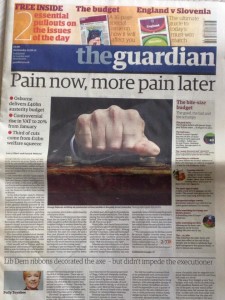Pain now …
Thu. May 7, 2015Categories: capitalist realism
A grief without a pang, void, dark, and drear,
This was the front page of the Guardian on the day my son was born nearly five years ago. That year, my wife and I earned fifteen thousand pounds between us. I was working as an hourly paid lecturer in adult education and in a university, as well as doing some freelance writing and copy-editing. We were able to survive without living in penury because of the three hundred pounds a month in tax credits we received.
This was the way Brownism and Blairism worked: allowing low wages and precarity to proliferate with one hand, mitigating their effects with benefits on the other. By then, like most of the population, I loathed New Labour. Labour had become so capitalist realist that surely it couldn’t be much worse if the Tories got in? I shared the widespread view that elections don’t change much: all that’s on offer are minimally different versions of the same thing (neoliberalism).
It soon became very clear that this was not the case. Cameron and Osborne unleashed Capitalist Realism 2.0, the most audacious confidence trick in recent political history: make the poor and vulnerable pay for the bank crisis. Use the crisis as a pretext to destroy even more of the welfare state. Sigh their fake sighs, and tell us what “difficult choices” they had to make …
Today, if my wife and I earned what we did in 2010, we would receive only 50 pounds in tax credits a month.
Of course, for me, working like this was something of a bohemian lifestyle choice. If I’d wanted to, I could probably have got better paid work – after all, only a fool would expect to enjoy working for a living. But what of all those stuck in low paid precarious work forever? The disabled? The long-term sick and the chronically mentally ill, forced back to work?
A stifled, drowsy, unimpassioned grief,
I wasn’t very interested in this election a few weeks ago. To be honest, even though I had been commissioned to write a piece about the TV coverage of the election, I couldn’t muster up the enthusiasm to watch the first debate (I’ll watch it later) until Laura Oldfield Ford, excited by Niciola Sturgeon’s performance, texted me and asked what I thought. I switched on ITV+1, and the process of re-awakening that has occurred in the last few weeks began.
For reasons I will explore more fully in subsequent posts, I have spent the last year in a state of de-activation. I was thrown back into the privatised connectivity of the OedIpod, with its constant stream of low-level anxiety and compulsive micro-enjoyments. I couldn’t write, except in a mechanical way; what I produced seemed stillborn, stilted. My main mood altering drug of choice, music, didn’t work. I binged on box sets. I enjoyed time with my wife and son, but there was a fugitive quality to this enjoyment: my fingers always itched to reach for my smartphone. There was always something I should already have done that I hadn’t – the urgencies piling up, like a flashing red light constantly blinking in my peripheral vision, never letting me settle. Most of these urgencies were small things, they didn’t matter too much, but perhaps there would be some long-forgotten urgency was going to calamitously re-emerge, too late for me to do anything about it? I’ll just check …
Which finds no natural outlet, no relief,
The coldly terrifying thing about this state of dejection was that it was not a completely paralysing depression – more a kind of exhausting drudgery. It felt liveable; indeed, it felt like I could – perhaps would – live the rest of my life in it. Perhaps I have expected too much from life. Now I would have to adjust to misery, like everyone else does. Others were much, much worse off than me. It wasn’t like I was to chip ice off the windscreen in the morning. I had been precarious for years – now I was in well-paid secure employment. Why couldn’t I just be happy? OK, so I had to do marketing promotions, complete ‘quality’ paperwork, amend module proposal forms six times – but it was hardly coal mining, was it?
You see, you see:
I had become once again the compliant subject of capitalist realism.
“…isolated, cut off, surrounded by hostile space, you are suddenly without connections, without stability, with nothing to hold you upright or in place; a dizzying, sickening unreality takes possession of you; you are threatened by a complete loss of identity, a sense of utter fraudulence; you have no right to be here, now, inhabiting this body, dressed in this way; you are a nothing, and ‘nothing’ is quite literally what you feel you are about to become.”
Engines of dejection
Bifo is right. It wants us to be dejected: not so catatonically depressed that we can’t work, but not so confident and secure that we will refuse to do bullshit jobs. (What is this it that wants us to miserable? Why, the real management of the Overlook Hotel of course. Our misery is like nectar to it …) Capital needs people desperate, scrambling on the edge (watch Tory MPs laugh at starving families!), it needs people scrimping and saving and crossing off lists, it needs people to be grateful for any work, no matter how poorly paid, no matter how insecure, struggle after struggle, year after year …
In the last five years, after the initial euphoria of dissent in 2010 and 2011, an acrid fog of despair has slowly but ineluctably sunk over what Cameron, chillingly, calls “our country” …. choking the social energy out of institutions (no time to talk, sorry!) … reducing workers to automata issuing commands to one another … diminishing, at every level, our capacity to care …. no time, no time …. no money … don’t know, I’ve got to go mate …. looking over our shoulders, fearing the worst …. maybe it will be me next … better stay in line … accept the extra workload, I’m afraid that’s how things are now …
Pain now, more pain later ….
Misery is over (if we want it)
The last week or so, I have, each day, played with my son for a few hours, been out on long walks, enjoying extended time with my wife, and managed to write thousands of words. Why can’t life always be like this? Why indeed? It’s only been possible because I have decided to suspend all my bureaucratic obligations until after the election. (Back to “proper” work tomorrow: so expect another post in a year or so.) I have managed to do this, not by some heroic act of magical voluntarist will, but because of a lift in mood that is not just personal. Scotland, Syriza, Podemos … it’s taken a long while for the significance of these developments to filter through to me … but talking to comrades … attending to what Plan C are up to …. feeling the electricity that Russell Brand has generated …. All of this has gradually returned to consciousness during this election campaign. I don’t think I’m the only one. But have we awoken too late to stop the Tories? Has their smog of dejection de-activated enough people – people who were hardly likely to have been reactivated by Labour’s campaign?
Shy effects
The two most obvious parallels for this election would seem to be 1974 – a weak Labour government, propped up by smaller parties, or, ominously,1992, with Labour crushingly defeated by John Major’s Tories after they were expected to win. Shaun Lawson makes a strong and convincing case for why today might turn out to be a re-run of 1992. Much of this is to do with the unreliability of polls. Because of the so-called “shy Tory” phenomenon – voters not admitting to pollsters that they would vote Conservative – the polls were spectacularly wrong in 1992. Major didn’t only win, the Tories ended up with the largest amount of votes ever cast for a political party in Britain. Lawson argues that, despite polling being adjusted to factor in the shy Tory effect, current polling may still be inaccurate (because, for instance, it tends to be internet-based, which biases things towards a younger demographic).
I’m not sure how convinced I am by the parallels with 92, however, for two reasons.
1. Hyperstitional effects. As Baudrillard argued, we can’t treat opinion polls as neutral positivist descriptions since they might well affect the very thing they are claiming to predict. It seems likely that this might have happened in ’92.
The atmosphere leading up to the 92 election was very different to that preceding the current contest. There was the disastrous Sheffield Rally. Kinnock’s triumphalist shout of “We’re alright!”, still excruciatingly embarrassing to remember nearly twenty five years on, not only destroyed the “statesmanlike persona” he had confected, it gave the impression of a manic and jubilatory over-confidence. The premature celebration came off as unseemly, desperate – as if Kinnock himself, never mind the electorate, couldn’t quite believe that he would be Prime Minister. It also gave Murdoch’s press something to really stoke the fears of reluctant Tories with, especially when the polls were suggesting that Labour would win: look, they think they’ve won! If you’re thinking of staying at home, don’t – every vote is needed!
It isn’t really like that this time. Polls are predicting a hung parliament, not a Labour victory – there isn’t the same resource of fear to feed off. Victory for Labour is uncertain, not an imminent possibility that needs to be desperately averted. Furthermore, while the Tories have certainly tried to scaremonger, a Labour government now is not the terrifying prospect that it could be made to seem in 92. After Blairism, Labour is no longer the Other to neoliberal commonsense that it could be presented as then.
As I said in the last post, Miliband has kept his campaign emotionally subdued – no extravagant promises (“I want to under promise and over deliver”); no messianic fervour (this by contrast with Blair as much as Kinnock). It’s true, Miliband doesn’t seem to have Prime Minesterial gravitas, but, then again, neither did John Major, surely the least likely Prime Minister ever.
2. We’re in New Times
In 1992, we were still in the high pomp of capitalist realism. The crash had not yet happened. There was still something on offer to those who wanted to vote in their own interests and let everyone else go hang.
The Tories have nothing very much to bribe most of their supporters with this time. Without the false balm of the “Big Society”, they only have a negative message – it will be worse under Labour – and a muted promise: pain now, a little less pain later. Is this enough to motivate the wavering?
Neoliberalism is finished as a project, even if it lurches on, thrashing around like a decorticated terminator. We’re finally groping our way, blinking, out of capitalist realism. The psychic blockade that prevented us from thinking and acting is lifting. This has only registered in this campaign in some minor way with the SNP, Plaid Cymru and the Greens (the multi-party nature of British politics now is of course another way in which we are in new times by comparison with 74 and 92). If Labour manage to form a government, we will be celebrating a Tory defeat far more than we will be hailing a Labour victory.
But nothing is certain at the moment. I don’t think there will be much certainty tomorrow either. My feeling is that things will be very volatile over the next few weeks. One thing is for sure: we need to be prepared to mobilise if the Tories attempt a coup. And they surely will …

